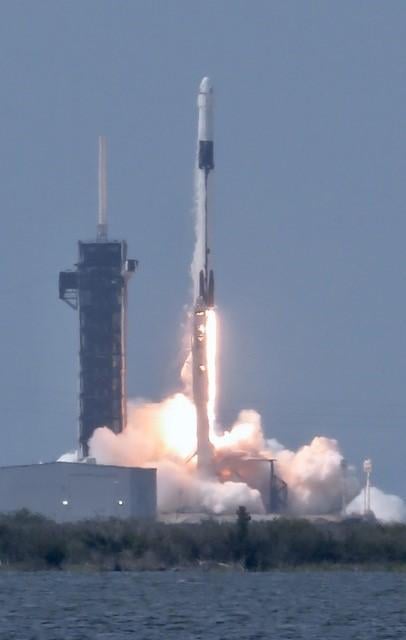
Two Republican lawmakers from Texas believe the successful SpaceX Demo-2 mission will increase congressional support for boosting NASA’s fiscal 2021 spending to help achieve the goal of a 2024 lunar return with astronauts.
U.S. Sen. Ted Cruz, chair of the Senate Commerce subcommittee on aviation and space, and U.S. Rep. Brian Babin, ranking member of the House Science space and aeronautics subcommittee, were among those closely following the May 31 docking of the Demo-2 SpaceX Crew Dragon to the International Space Station (ISS) with astronauts Doug Hurley and Bob Behnken. The linkup unfolded less than 24 hr. after a successful launch from NASA’s Kennedy Space Center.
“I’m very confident that we’ll continue to fund NASA and fund NASA aggressively,” said Cruz, who like Babin joined NASA Administrator Jim Bridenstine and Mark Geyer, director of NASA’s Johnson Space Center (JSC), outside JSC’s visitor center for a briefing following the Crew Dragon’s arrival at the ISS.
“Listen, this is a time in our country when there is a lot of partisan division, seemingly over what time of day it is,” said Cruz, who was among the bipartisan sponsors of the NASA Transition Authorization Act of 2017—signed by President Trump—and the U.S. Commercial Space Launch Competitiveness Act of 2015—signed by former President Obama.
“When you’ve got one bill signed by Obama and one bill signed by Trump, that doesn’t happen too often,” Cruz said. “I think it’s a reflection of the agreement and commitment we’ve gotten. I’m certainly committed to lead a bipartisan effort to make sure that NASA remains the preeminent space agency on the face of the Earth and that America leads the world and leads humanity in the exploration of space, exploring the Moon and exploring Mars and beyond.”
The Trump administration is seeking $25.25 billion for NASA for the fiscal year that begins Oct. 1, a 12% annual increase. The budget proposal seeks $8.76 billion for deep-space exploration systems, a 45% increase. At the same time, the 2021 budget request also reflects a $6.3 billion request for NASA’s science portfolio, a decline of nearly 12%.
House Science Committee chairwoman Eddie Bernice Johnson, a Texas Democrat, and space and aeronautics subcommittee chair Kendra Horn, an Oklahoma Democrat, issued a joint statement May 31 praising NASA and SpaceX for safely launching and reaching the ISS with Hurley and Behnken. However, on May 1 the two democrats jointly questioned the safety of NASA’s planned collaboration with commercial space companies on a Human Landing System to shuttle astronauts between lunar orbit and the surface of the Moon. Initial contracts were awarded to teams led by contractors Blue Origin, Dynetics and SpaceX.
“There is nothing like success to help get the funding,” Babin told the news briefing, staged before an outdoor SpaceX Falcon 9 core stage that was unveiled for public display by Space Center Houston, an affiliate of the Smithsonian Institution’s Air and Space Museum, in March. The reused rocket was the first launched twice by SpaceX, successfully delivering cargo to the ISS in July and December 2017.
.”It’s a bipartisan effort,” Babin said. “I’m really optimistic that we will fund this and go forward and that the Artemis program will do just as we are planning. Certainly, there will probably be problems and hurdles, but we will work through them. I’m very, very optimistic we will get the funding.”





